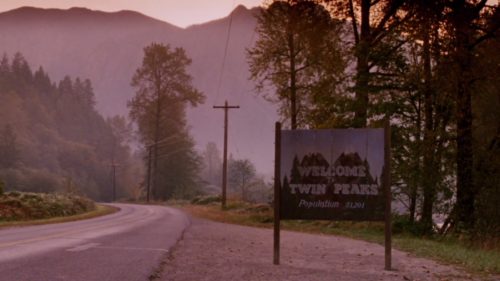TWH – Twin Peaks was originally a surreal crime drama airing for two seasons in the early 1990s. Created by Mark Frost and David Lynch, the show first received rave reviews for its unique blend of storytelling and visuals. In 1991, New York Times reviewer William Grimes wrote, “For an intoxicating few months, ‘Twin Peaks’ seemed to be crackling away on every synapse in the collective American brain. The massively promoted two-hour pilot that kicked off the series just over a year ago lured nearly 35 million viewers, a third of the nation’s television audience.”

Those numbers fell sharply over the season and into the second season, forcing the seemingly cultural tour de force to close up shop in June 1991 after only 30 episodes. As quoted by Grimes, Frost speculated, “I don’t think [the show] changed television one iota. No trend developed from this show whatsoever. The networks are more entrenched than ever in the conglomerate, bottom-line mentality.”
His observation is partially true. However it was at this time that Matt Groening’s The Simpsons, with its own subversive themes and cultural challenges, had become a nationwide hit. The difference lies in the presentation. Frost and Lynch moved through themes within a slow-building drama, whereas Groening captured his biting social commentary within animated comedy.
Despite its quick demise, Twin Peaks did develop a cult following. More specifically, Lynch fans were not so easily ready to abandon the show to the pages of history. In 1992, New Line Cinema released the feature film Twin Peaks: Fire Walk With Me. However, mirroring the show’s final days, the film, which was directed by Lynch and was a prequel to the series, was not well-received in the United States and only had limited success internationally.
Then in 2014, over 20 years later, Showtime announced that it would be resurrecting the long-dormant narrative for a new series created by both Frost and Lynch. That show is known as Twin Peaks: the Return and stars Kyle MacLachlan. It began airing in May, 2017.
It is scheduled to continue through September. According to Showtime, the show has to-date garnered the “most streaming viewers” for any of its original shows. The question still remains on whether or not the new iteration of Twin Peaks, which has been called “trippier” than the original, can retain a viewership outside of its dedicated fans.
In 2014, the Hollywood Reporter speculated why Twin Peaks, a daring and evocative drama, would not maintain its impact on American viewers.
The problem with Twin Peaks is not the show. The problem here is the viewer; and it’s unavoidable. For as classy, clever and well-spun as Twin Peaks is, it makes the mistake of presuming the viewer will watch and listen and perceive. Not so.
Lynch expects the viewer to suck the Tootsie pop slowly until the inner chewy nucleus is revealed. TV viewers chomp through their pops.
But concentration is such a rare event in television viewing that any hope of following the intricacy of Twin Peaks is a dream.
This comment hearkens back to Frost’s own 1991 statement speculating that television producers seek to appeal to a “bottom-line mentality.”
That Hollywood Reporter observation also points to the unique content and storytelling present in the original show, much of which contained beautiful visuals laced with esoteric themes and underlying surrealism. None of this is surprising, considering Lynch was involved.
Outside of his other cinematic works (e.g., Blue Velvet, 1986), Lynch has spoken openly about his own experience with transcendental meditation and the importance of such work. In 2016, Interfaith Radio broadcast an interview between Mitch Horowitz and David Lynch on that very subject.
The esoterica and surrealism embodied within Twin Peaks narrative text and visuals is a fascinating subject for both the student of pop culture as well as people engaging with the many forms of occult practices. Lynch and Frost’s show is certainly not the first to delve into this world. Outside of kitschy Halloween witchcraft, the occult has been infused into films and television, subtly or not, since the early silent era (e.g. Metropolis, 1927)
However, it is important to recognize that Lynch and Frost produced this show during a time when the occult expressions were being demonized. The Satanic Panic may be partly to blame for the show’s quick demise.
Either way, the show’s expressions of esoterica have captured many people’s imaginations, including journalist ZB. In 2015, she began a project to examine the varied occult themes and spiritual concepts present within the original show. She likened watching the show to a journey.
The essay, originally written for an academic journal, discusses the scope and breadth of symbolism and esoteric concepts that she found hidden with the show’s text. ZB writes, “Twin Peaks esoteric symbolism is derived from many sources but with a seemingly predominant message- the unification of dualities within, finding balance in nature and the constructs of alternate realities. The attainment of this non-duality can be achieved through Taoism and spiritual alchemy to which the film intentional or not makes many references.”
ZB shared this essay with us and we have included it here in its complete, unabridged form. She writes, “Twin Peaks has an underlying message of how humanity’s polarized thinking, detachment from nature and rigid social constructs results in destructive behavior.”
The Wild Hunt is not responsible for links to external content.
To join a conversation on this post:
Visit our The Wild Hunt subreddit! Point your favorite browser to https://www.reddit.com/r/The_Wild_Hunt_News/, then click “JOIN”. Make sure to click the bell, too, to be notified of new articles posted to our subreddit.